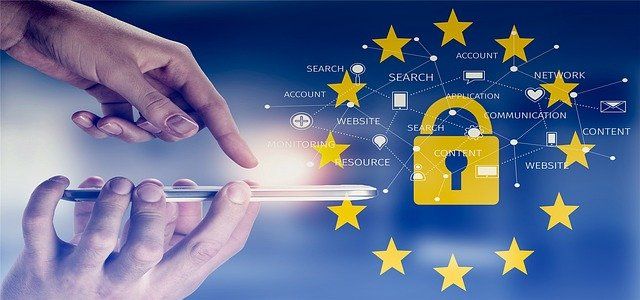AI and Data Privacy: Unraveling the Complex Relationship
This blog post explores the critical relationship between artificial intelligence (AI) and data privacy. It covers legal frameworks, ethical considerations, and best practices for protecting personal data and emphasizes the importance of responsible AI use to safeguard individual privacy rights.

Artificial Intelligence (AI) is the simulation of human intelligence in machines programmed to think and act like humans. This technology involves machine learning algorithms, natural language processing, and neural networks that enable machines to perform tasks requiring human intelligence. AI can be used for various applications, including image recognition, natural language processing, predictive analytics, and decision-making.
Data Privacy
Data privacy protects personal information from unauthorized access, use, disclosure, and destruction. Personal information can include names, addresses, phone numbers, social security numbers, medical records, financial information, and other sensitive information that can be used to identify an individual. Data privacy laws regulate how personal information is collected, stored, and shared, providing individuals with certain rights and protections.
Importance of AI and Data Privacy
AI and data privacy are two critical aspects of modern technology that significantly impact society. AI has the potential to transform various industries and improve people's lives, but it also raises concerns about the use of personal information and the potential risks of AI. Data privacy is essential for protecting individuals' rights and ensuring that personal information is not misused or abused. It is crucial to balance AI and data privacy to ensure that the benefits of AI can be realized while safeguarding personal information.
The importance of AI and data privacy is evident in the increasing number of data breaches and cyber-attacks that have occurred in recent years. These incidents have highlighted the need for better data protection measures and stricter regulations to safeguard personal information. The rise of AI has also raised concerns about how personal data is collected, used, and stored and the potential risks associated with AI applications. Therefore, it is crucial to understand the complex relationship between AI and data privacy to develop effective strategies and policies to address these concerns.

AI and Data Privacy
Artificial intelligence (AI) has transformed how we interact with technology, making our lives more convenient. AI systems use personal data to perform various tasks, from recommending products to predicting our preferences. However, this widespread use of personal data has raised privacy concerns. This article will explore the relationship between AI and data privacy, how AI uses personal data, and the potential risks of AI to data privacy.
Relationship between AI and Data Privacy
Data privacy protects personal data, such as our names, addresses, and social security numbers, from unauthorized access or use. AI relies heavily on data; the more data an AI system has access to, the more accurate its predictions will be. However, using personal data in AI systems raises concerns about data privacy.
AI systems can collect data from various sources, including social media platforms, mobile apps, and other online services. This data can be used to create profiles of individuals, which can then be used to predict their preferences, behavior, and other personal information. While this can lead to personalized recommendations and improved services, it also risks data privacy.
How AI Uses Personal Data
AI systems use personal data in various ways, such as:
1. Predictive Analytics
AI systems can analyze large amounts of data to predict individual behavior. For example, an AI system may analyze an individual's search history and social media activity to predict their interests and preferences.
2. Personalized Recommendations
AI systems use personal data to make personalized products, services, and content recommendations. For example, an AI system may use an individual's browsing and purchase history to recommend products they are likely interested in.
3. Fraud Detection
AI systems can use personal data to detect fraud and other types of criminal activity. For example, an AI system may analyze an individual's financial data to detect unusual transactions indicative of fraud.
Potential Risks of AI about Data Privacy
The use of personal data in AI systems can pose several risks to data privacy, including:
1. Security Breaches
AI systems store large amounts of personal data, making them a target for hackers. A security breach in an AI system can lead to the theft of personal data, which can be used for identity theft and other types of fraud.
2. Bias and Discrimination
AI systems can perpetuate biases and discrimination, especially if trained on biased data. For example, an AI system used in hiring may perpetuate biases against certain groups of people.
3. Lack of Transparency
AI systems can be opaque, making it challenging for individuals to understand how their data is used. This lack of transparency can erase trust in AI systems and lead to concerns about data privacy.
AI has transformed how we interact with technology, providing numerous benefits, including personalized recommendations and improved services. However, the use of personal data in AI systems poses risks to data privacy. Individuals and organizations need to be aware of these risks and take steps to protect personal data. Additionally, policymakers should consider the potential risks of AI data privacy when developing regulations and guidelines for AI systems.

AI and Data Privacy: Issues and Challenges
1. Massive Data Collection
AI systems require great amounts of data to function efficiently. The collection of this data poses a significant challenge to privacy, as personal and sensitive information is often gathered and stored, sometimes without user consent or awareness.
2. Inadequate Data Anonymization
Data anonymization is a process that protects personal information by removing identifiable markers. However, with AI's advanced analytical capabilities, it is becoming increasingly possible to re-identify individuals from anonymized data sets, leading to privacy breaches.
3. Biased Algorithms
AI algorithms perpetuate existing biases and stereotypes in the data sets they analyze. It can lead to unfair treatment, discrimination, or privacy violations, particularly for vulnerable populations.
4. Surveillance and Tracking
AI-powered surveillance technologies, such as facial recognition and location tracking, can be used for invasive monitoring and data collection, raising concerns about individual privacy rights and potential abuse.
AI as a Threat to Privacy: Real-life Incidents
1. Cambridge Analytica
In a scandal that made international headlines in 2018, political consulting firm Cambridge Analytica was found to have harvested personal data from millions of Facebook users without their consent, using the information to create targeted political ads. The incident exposed the vulnerabilities of social media platforms and the potential for AI to compromise user privacy.
2. Clearview AI
Clearview AI, a facial recognition technology company, faced criticism in 2020 for scraping billions of images from social media and other online sources without user consent, creating a massive facial recognition database. It raised concerns about the potential for abuse and the lack of transparency in AI-powered surveillance technology.
Legal Framework for Data Privacy
The proliferation of data-driven technologies has made privacy a critical concern for individuals and organizations worldwide. The legal framework for data privacy has evolved to address the risks and challenges associated with data processing, storage, and transfer.
1. Overview of Data Privacy Laws
Data privacy laws are a set of regulations that govern how personal data should be collected, processed, stored, and shared. These laws are designed to protect individuals' fundamental right to privacy and prevent the misuse of their personal information. The legal framework for data privacy varies across countries and regions, with some having comprehensive data protection laws while others have limited or no laws at all.
In the European Union (EU), the General Data Protection Regulation (GDPR) is the primary law governing data protection. The GDPR provides a set of rules that organizations must follow when collecting, processing, and storing personal data. It also gives individuals certain rights, such as the right to access their data, correct inaccuracies, and erase them.
Data privacy laws are a patchwork of state and federal laws in the United States. The California Consumer Privacy Act (CCPA) is one of the US's most comprehensive data privacy laws. The CCPA gives California residents the right to know what personal information is being collected about them, the right to have their information deleted, and the right to opt out of the sale of their data.
GDPR and CCPA
The GDPR and CCPA are two of the world's most significant data privacy laws, with far-reaching implications for organizations that collect and process personal data.
The GDPR applies to all organizations that process the personal data of EU residents, regardless of where the organization is located. It means that any organization that collects and processes personal data from EU residents must comply with the GDPR's requirements. Failure to comply can result in hefty fines of up to 4% of an organization's global annual revenue or €20 million, whichever is higher.
The CCPA applies to all organizations that do business in California and meet certain criteria. It includes organizations that have annual gross revenues of more than $25 million, collect personal information from more than 50,000 California residents, or derive more than 50% of their annual revenue from selling California residents' personal information. The CCPA gives California residents the right to know what personal information is being collected about them, the right to have their information deleted, and the right to opt out of the sale of their data.
3. How do Data Privacy Laws Impact AI?
Data privacy laws significantly impact AI, as AI systems rely on vast amounts of personal data to function effectively. Data privacy laws impose several requirements on organizations that collect and process personal data, which can impact the development and deployment of AI systems.
For instance, the GDPR requires organizations to obtain individuals' explicit consent before collecting and processing their data. It means that organizations must provide individuals with clear and concise information about how their data will be used and obtain the core processing of their data. It can make it more challenging for organizations to collect and process the large datasets required to train AI models.
Similarly, the CCPA allows California residents to opt out of selling personal information. It can impact the development of AI systems that rely on personal data obtained through data brokers or other third-party sources.
4. GDPR And CCPA Are Two Of The Most Significant Data Privacy Laws
Data privacy laws are a critical component of the legal framework governing the use of personal data. The GDPR and CCPA are two of the most privacy laws in the world, with far-reaching implications for organizations that collect and process personal data. These laws impose several requirements on organizations that can impact the development and deployment of AI systems. Organizations must implement robust data protection measures, such as data anonymization and encryption, to minimize the risks of data breaches and ensure that personal data is only used for legitimate purposes. Furthermore, organizations must be transparent about collecting, processing, and using personal data and obtain individuals' explicit consent where required.

Ethical Considerations
As artificial intelligence (AI) continues to revolutionize industries and reshape society, it is essential to consider the ethical implications of AI systems. AI has the potential to impact individuals and communities in significant ways, and organizations must ensure that their AI systems are designed and deployed ethically and responsibly.
1. Bias in AI
Bias in AI refers to the tendency of AI systems to reflect and amplify existing societal biases. AI systems are only as unbiased as the data they are trained on, and if the data contains biases, the AI system will produce biased outcomes. Bias in AI can have significant implications, including perpetuating discrimination and exacerbating existing inequalities.
To mitigate bias in AI, organizations must ensure that their AI systems are trained on diverse and representative datasets. It includes ensuring that the data is free of bias and that the data collection process is transparent and unbiased. Additionally, organizations must implement measures to detect and correct bias in AI systems, such as conducting bias audits and using interpretability tools.
2. Transparency in AI
Transparency in AI refers to the principle that AI systems should be explainable and understandable to the people they affect. AI systems are often complex and opaque, making it challenging for individuals to understand how they work and why they produce certain outcomes. A lack of transparency in AI can erode trust in AI systems and prevent individuals from making informed decisions.
To promote transparency in AI, organizations must implement measures to ensure that their AI systems are explainable and understandable. It includes using techniques such as explainable AI and providing individuals with clear and concise information about how AI systems work and how they are being used. Additionally, organizations must be transparent about the data they collect and how it is used and obtain individuals' explicit consent where required.
3. Responsibility in AI
Responsibility in AI refers to the principle that organizations must be accountable for the outcomes of their AI systems. AI systems can significantly impact individuals and communities, and organizations must ensure that their AI systems do not cause harm or perpetuate unethical practices.
To promote responsibility in AI, organizations must implement measures to ensure that their AI systems are designed and deployed ethically and responsibly. It includes conducting thorough risk assessments and ensuring AI systems comply with relevant laws and regulations. Additionally, organizations must be transparent about the limitations and potential risks of their AI systems and establish processes to address any negative impacts that may arise.
Best Practices for AI and Data Privacy
As organizations increasingly adopt artificial intelligence (AI) technologies, they must prioritize data privacy and implement best practices to safeguard personal data. Read on to find the best practices for AI and data privacy, including data minimization, privacy by design, anonymization, and pseudonymization, and data protection impact assessments (DPIAs).
1. Data Minimization
Data minimization refers to the principle that organizations should only collect and process the minimum personal data necessary to achieve their objectives. It includes avoiding the collection of unnecessary personal data and limiting the retention of personal data to only what is needed for a specific purpose. Data minimization is critical in protecting individuals' privacy rights and reducing the risk of data breaches and misuse of personal data.
To implement data minimization best practices, organizations should establish clear data retention policies and regularly review their data collection and processing practices. Organizations should also consider implementing techniques such as de-identification and differential privacy to minimize further the amount of personal data collected and processed.
2. Privacy by Design
Privacy by design is an approach to developing AI systems prioritizing privacy and data protection from the outset. It includes integrating privacy and data protection principles into designing, developing, and deploying AI systems. Privacy by design aims to ensure that privacy and data protection are not afterthoughts but are built into the core of AI systems.
To implement privacy-by-design best practices, organizations should conduct privacy impact assessments (PIAs) to identify and address potential privacy risks associated with their AI systems. Organizations should also adopt privacy-enhancing technologies, such as differential privacy and homomorphic encryption, to protect personal data while allowing for data analysis.
3. Anonymization and Pseudonymization
Anonymization and pseudonymization are techniques used to protect personal data by removing or replacing identifiers that can link data to specific individuals. Anonymization refers to removing all identifying information from data, whereas pseudonymization involves replacing identifiers with unique identifiers that cannot be linked to an individual.
To implement anonymization and pseudonymization best practices, organizations should use these techniques to minimize the risk of re-identification and ensure that personal data is protected. Organizations should also establish clear policies and procedures for anonymization and pseudonymization, including guidelines for safely handling and storing anonymized and pseudonymized data.
4. Data Protection Impact Assessments (DPIAs)
Data protection impact assessments (DPIAs) are assessments organizations can conduct to identify and assess the privacy risks associated with their AI systems. DPIAs involve identifying the types of personal data that will be collected and processed, assessing the potential privacy risks associated with the data, and identifying measures to mitigate those risks.
To implement DPIA best practices, organizations should conduct DPIAs regularly and thoroughly to identify and address privacy risks associated with their AI systems. Organizations should also involve stakeholders, such as data protection authorities and individuals, in the DPIA process to ensure that all perspectives are considered.
Conclusion
Artificial intelligence (AI) transforms how we live, work, and interact with the world. However, with the increased use of AI comes the responsibility to protect personal data and ensure that AI systems are designed and deployed ethically and responsibly.
Recap of the Importance of AI and Data Privacy
AI can bring significant societal benefits, including increased efficiency, improved decision-making, and the development of new products and services. However, the use of AI also raises significant privacy concerns, particularly about collecting and using personal data. Organizations must prioritize data privacy, implement best practices to safeguard personal data, and ensure that AI systems are designed and deployed ethically and responsibly.
Call to Action for Responsible AI Use
To ensure that AI systems are designed and deployed responsibly, organizations must prioritize data privacy and adopt best practices such as data minimization, privacy by design, anonymization, pseudonymization, and DPIAs. Additionally, organizations must address issues of bias and transparency in AI to ensure that AI systems are fair and accountable. Furthermore, governments and regulators must work together to establish clear legal frameworks for data privacy and AI to ensure that these technologies are used to protect individuals' privacy rights.
Outlook for AI and Data Privacy
As AI technologies evolve, organizations and policymakers must remain vigilant in protecting individuals' privacy rights. In the future, AI technologies are likely to become even more sophisticated, and the use of AI is expected to become even more widespread across various industries. Organizations must continue to prioritize data privacy and adopt best practices for AI to ensure that these technologies are used in a manner that is ethical, responsible, and transparent.



